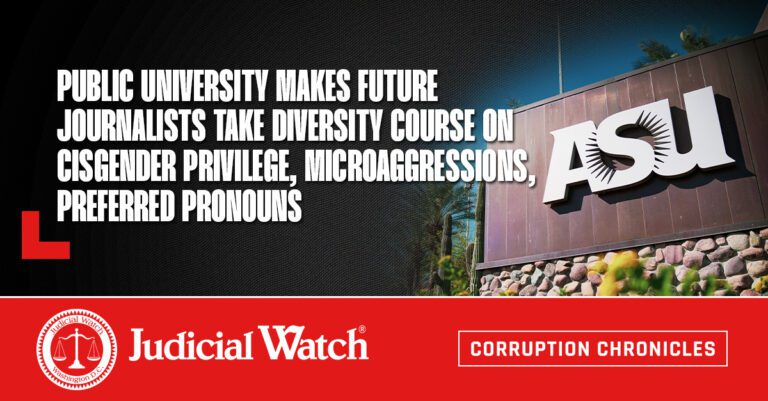

Public University Makes Future Journalists Take Diversity Course on Cisgender Privilege, Microaggressions, Preferred Pronouns


In an apparent effort to keep with the mainstream media’s leftwing ideology, future journalists at a public university must endure a curriculum that includes a course on identity politics, microaggressions, cisgender privilege and the use of preferred pronouns. One assignment requires students to develop a public relations plan for a nonbinary pop star that uses “they/them” pronouns. Another argues that objecting to men using women’s bathrooms is an example of discrimination against transgender individuals. The mandatory course for students in three journalism-related undergraduate programs at Arizona State University (ASU) is called Diversity and Civility at Cronkite and material—including course syllabi, assignments and readings—obtained by a conservative Phoenix-based thinktank “reveals a radical agenda that argues for the primacy of identity and spends large portions of class time on trendy concepts in progressive activism.”
The nonprofit, Goldwater Institute, founded in the late 80s with the blessing of U.S. Senator Barry Goldwater, describes itself as a free-market public policy research and litigation organization dedicated to advancing the principles of limited government, economic freedom, and individual liberty. The group obtained detailed information about the ASU diversity course after engaging in a “prolonged public records request process” with the taxpayer-funded college. In the material one instructor writes that “Diversity and Civility is an entry level course to bring thoughtful, open minded discourse to issues of race, gender, sexual orientation, ability, income, geography, and age.” Another instructor similarly writes that the class is intended to bring thoughtful, open-minded discourse to issues of race, gender, sexual orientation, ability, income, geography, and other aspects of our identities.” One syllabus tells students that the class is the first step in their DEI—diversity, equity, and inclusion—practice as a journalist or communications professional. The assigned readings and activities promote the concept that race, gender identity, and sexuality are the most important aspects of a person’s experience, according to the Goldwater Institute’s analysis.
Journalism students are taught that statements such as “America is a melting pot” are examples of offensive microaggressions. Other statements, such as “I believe the most qualified person should get the job” or “everyone can succeed in this society, if they work hard enough,” are also problematic because they communicate that “people of color are lazy and/or incompetent and need to work harder.” An entire week is dedicated to a discussion of “sexuality and gender identity,” with the goal of teaching future reporters to understand the difference between sexuality and gender identity when it matters, recognize privileges related to sexuality and gender identity and how to ask for a person’s pronouns as well as the benefits of gender-neutral language. More than 400 students were required to take the course in fall 2023 alone at Arizona’s largest taxpayer-funded university, the Goldwater Institute reveals, adding that the undergraduates spent over 2,000 hours on class work during that time.
Named after the infamous network television news anchor Walter Cronkite, ASU’s journalism school is ranked nationally as is ASU in various college ratings. The Broadcast Education Association has ranked it a top school and it is widely recognized as one of the country’s premier journalism and mass communications programs, according to its website. “Rooted in the time-honored values that characterize its namesake — accuracy, responsibility, objectivity, integrity — the school fosters excellence and ethics among students as they master the professional skills they need to succeed in the digital media world of today and tomorrow,” the ASU journalism school website states. Researchers at the Goldwater Institute point out in their report that “forcing students to divert time and tuition dollars away from core academic pursuits—and expending university resources on faculty teaching assignments in support of mandatory classes such as DCC—undermines the institution’s ability to prioritize academic rigor and affordability.” The records show that there is a need for curricular reform at Arizona’s public universities, the group says.















